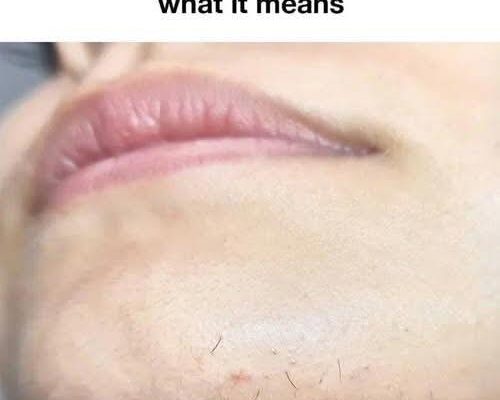Chin Hair in Women: What It Could Mean for Your Health

You Deserve to Know This Sooner: What Chin Hair Might Be Telling You
Chin and neck hairs aren’t just a male trait—testosterone, a hormone produced by all sexes, can cause hair to appear in these areas. For women, however, noticeable chin hair can sometimes signal something more than just a cosmetic concern.
Hair is part of what makes each of us unique. Just like skin tone or eye color, the type, texture, and amount of hair we grow is determined by a complex mix of genetics and hormones.
So Why Do Some Women Get Chin Hair?
It’s actually quite normal to spot a few fine or dark hairs around the chin or neck. These often appear due to natural hormonal fluctuations that occur throughout life—during puberty, pregnancy, or menopause.
We all have two basic types of hair:
-
Vellus hair: the soft, fine fuzz covering most of our body
-
Terminal hair: the thicker, darker kind found on the scalp, underarms, and sometimes the face
Testosterone, the primary male sex hormone (which women also produce in smaller amounts), can convert vellus hair into terminal hair by activating specific receptors in hair follicles. This is a normal process that happens in everyone, especially during periods of hormonal change.
What About Those Random Long Hairs?
Seeing a few stray chin or neck hairs—especially as you age—is usually nothing to worry about. They may be more common in some women due to genetic factors, menopause, or how sensitive individual hair follicles are to testosterone. These follicles can vary in how quickly and thickly they grow hair.
When Chin Hair Is a Health Signal
Occasional facial hair is common. But if you’re noticing thick, dark hair in areas like the chin, upper lip, chest, or abdomen, you may be experiencing hirsutism—a condition marked by excessive hair growth in women. Hirsutism is more common among people of Middle Eastern, South Asian, African American, and Hispanic descent.
What sets hirsutism apart from normal hair growth is the texture, density, and darkness of the hair. It’s often the result of excess androgen (male hormone) levels and can point to an underlying issue, especially if it appears suddenly.
Conditions Linked to Excess Facial Hair:
-
Polycystic Ovary Syndrome (PCOS): Affects 6% to 13% of women of reproductive age. Caused by hormonal imbalances, it often leads to facial hair, irregular periods, weight gain, acne, and ovarian cysts.
-
Adrenal Gland Disorders: Tumors or dysfunction in the adrenal glands can lead to excess androgen production, resulting in symptoms like facial hair, voice deepening, and sudden weight gain.
-
Late-Onset Congenital Adrenal Hyperplasia (CAH): A genetic condition affecting hormone production in the adrenal glands.
-
Cushing’s Disease: Caused by too much cortisol in the body, it can lead to facial hair, headaches, high blood sugar, and significant weight gain.
-
Medications: Drugs such as anabolic steroids, testosterone, and cyclosporine (an immunosuppressant) can trigger increased facial hair as a side effect.
When to See a Doctor
Reach out to a healthcare provider if you notice:
-
Sudden or excessive hair growth on your face, abdomen, or other areas
-
A deepening voice or rapid weight gain
-
Changes in your menstrual cycle (irregular, missed, or heavy periods)
-
Thinning hair on the scalp
-
New or worsening acne
-
Persistent headaches
These could be signs of a hormonal imbalance or another condition that may need medical attention. Your doctor may recommend blood tests, hormone panels, or imaging to help pinpoint the cause—and guide you toward effective treatment.



